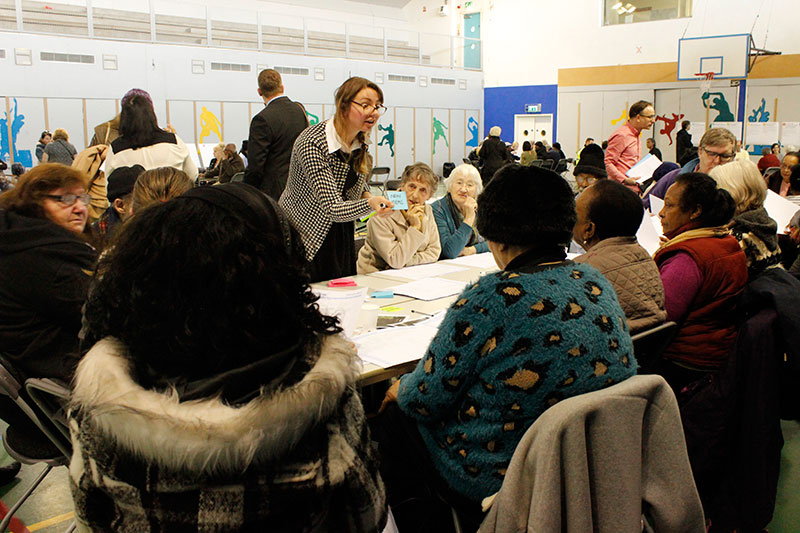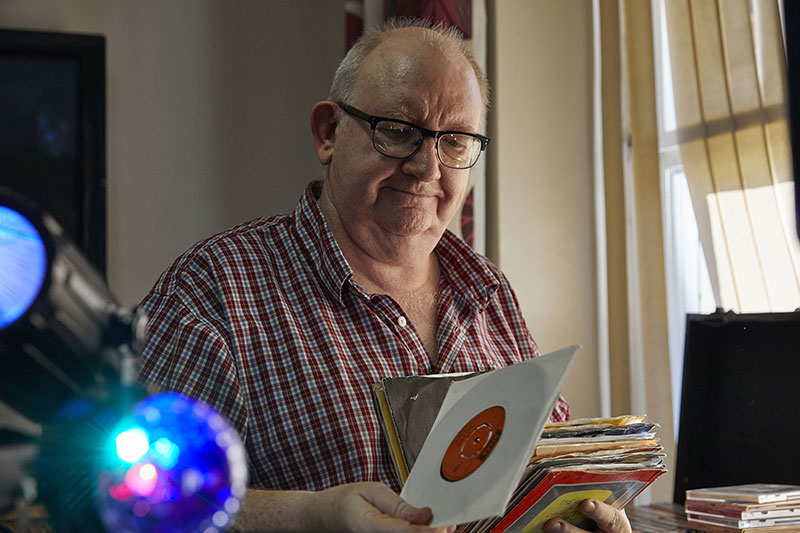Creating communities
There is no denying it, whether we like it or not, we’re all getting older.
The UK population has doubled over the last 140 years, reaching a new high of 66 million people in 2017, and we’re all generally living longer.
In 2015 there were 907,000 people aged over 50 in Greater Manchester, but 20 years from now this will rise to 1.1 million people – that’s 37% of our cityregion population.
Of course, an ageing population isn’t a bad thing. It’s possibly the greatest achievement of the 20th century. It reflects improved health care, advances in medicine, as well as better standards of living and education.
But it does raise the urgent question of what cities are doing to adapt to this growing and ageing population, as both inevitably bring a change in needs and demands, from transport, social needs and housing.
According to Professor Stefan White in the Manchester School of Architecture (MSA), millions of older people in Britain miss out on much better lives because of inadequate neighbourhood facilities combined with poor transport. This makes it difficult for them to socialise, enjoy open spaces, buy good food, access entertainment, and even to see a health practitioner.
But Professor White and colleagues in the MSA are rising to the challenge to find ways to make Greater Manchester a great place to grow older.
“As a society, we still talk about older people as if they are a problem that needs fixing, rather than an opportunity to improve our cities”
The world’s first
Around a decade ago, a group of MSA researchers, local partners and community members started to create and deliver the world’s first age-friendly neighbourhood.
The concept is based around a multifaceted understanding of what makes a neighbourhood good, by developing partnerships in localities, led by older people and supported by the team’s research.
The project, funded by the Big Lottery, through the Greater Manchester-wide Ambition for Ageing programme, uses the World Health Organisation’s age-friendly city definition and evaluation checklists to investigate how they can improve the physical and social environment of communities.
The project initially began with ‘Age-Friendly Old Moat’ – a partnership with Southway Housing Trust to reduce social isolation in the Old Moat area of Manchester. It was the first time that the World Health Organisation age-friendly framework had been applied to a neighbourhood.
Karen Mitchell, Chief Executive at Southway Housing Trust, said: “Old Moat has a higher than average proportion of older residents and socially rented homes, and elements of a ‘naturally occurring retirement community’, which provides the opportunity to reshape services and to address social isolation for older residents. “Our partnership with Manchester Metropolitan has been a cornerstone of the project. It brings together our practical knowledge of the neighbourhood and services, with the academic expertise of Manchester Metropolitan, the challenging and innovative ideas of the students and the older people themselves who have the ‘lived experience’ and passion to want to make it a great place to live.”
From the success in Old Moat, the project has now grown and further funding has been provided to create the Manchester Age- Friendly Neighbourhoods project, which has expanded to five other areas of Greater Manchester: Moston, Burnage, Miles Platting, Hulme and Moss Side.
Manchester Age-Friendly Neighbourhoods

“As a society, we still talk about older people as if they are a problem that needs fixing, rather than an opportunity to improve our cities,” explained Dr Mark Hammond, Senior Lecturer at the MSA and lead researcher on the Manchester Age-Friendly Neighbourhoods project.
“There isn’t a one-size-fits all solution to making a place more age-friendly. Through our research, we work with communities to look at the specific things that would make a difference locally, and how we can work together to achieve them.”
The aim of this most recent strand of the project is to provide older people with opportunities to become active members of their community by removing barriers they face in their daily lives, provide more ways for them to get involved and develop more activities to make the neighbourhood more age-friendly.
Researchers believe that the answer to this lies in better planning by city-wide partnerships, informed by the team’s research.
The approach meant involving citizens in developing ways to meet their needs and decide what might work well for them, as well as bringing their needs to the attention of the Greater Manchester Combined Authority.
After 300 coproduction activities and 6,000 conversations, each area had created a board of residents, service providers and researchers that would get together to make decisions and manage the community investment fund provided by the project to support the development of local initiatives and make where they live a better place for the elderly.

The investment fund allocates up to £2,000 per community initiative – decided by a board of local people.
The project, now in its third year, has spent three quarters of its funding on around 125 different initiatives, all making an impact on the lives of the elderly.
Initiatives have included activities such as monthly theatre trips, and lunch, exercise and activity clubs. There have also been practical changes to neighbourhoods, including making accessible toilets and designing new bus routes.
Award-winning
In the opening stages of research on the age-friendly project, researchers reached the stark conclusion that older people generally felt there was nothing to do in their neighbourhoods.
However, working with partners, Geeks for Social Changes, they discovered there were actually dozens of events happening each day, but that small community groups lacked knowledge of how to promote them by any other means than word of mouth.
And with more activities in the pipeline through the Age-Friendly Neighbourhoods project, they knew they had to do something to help.
In response, the team created PlaceCal – a shared online community events calendar that allows organisations to automatically transfer items from their existing calendar onto an all-in-one system to promote their events. The calendar allowed residents to see everything that was going on in their area in one place.
The initiative was funded by CityVerve – a project that aims to deliver a smarter, more connected Manchester through technology – and supported by Manchester City Council.

Dr Kim Foale from Geeks for Social Change and developer of PlaceCal, said: “Over the last ten years it’s got harder to get good community information on the internet – it’s disconnected, ad-hoc, and reliant on each organisation to create, publish and distribute their own material.
“The use of the internet and social media has broken down community cohesion. Where we used to get information from our neighbours, we now get it from Facebook or Twitter, creating a huge issue of social isolation in our ageing communities.
“The goal of PlaceCal is to be used as a central tool to help neighbourhoods get really well organised by working together and providing a shared source of information which is easy to use, so that these smaller community groups finally feel like technology can help them rather than add to their workload.
“We know that there is a huge lack of tech skills in these communities, so the calendar doesn’t just serve as an asset map, or a directory, or a piece of software – it’s a fundamentally different way of thinking about community information, skills and training. It has enabled a huge range of tools to be used in conjunction with it to create new possibilities that couldn’t happen before.”
The initiative has since been recognised with a Smart Ageing Prize – a collaboration between the Active and Assistive Living Programme and Nesta’s Challenge Prize Centre, set up to improve older people’s lives using accessible digital technologies.
Ged’s age-friendly disco

You might have your own idea of what a 66-year-old man does in his spare time, but retired civil servant Ged Reek might disagree.
He stands behind his record decks, flicking through his thousands of LPs, bopping away to his favourite tunes and providing entertainment all across Manchester.
Maybe not quite Dave Haslam at the Hacienda, but Reek plays for the “more mature” residents of Manchester every week and has brought his love for music back to life.
He moved to North Manchester five years ago to be closer to his daughter after his wife became ill and moved into long-term care. He’d started to spend a lot of time on his own and soon started to feel isolated.
“I came to Manchester to be closer to my daughter, but it’s hard being an older man moving to a new place – I felt a bit out of it. I used to do a lot of volunteering in Stockport, but coming here I didn’t know anyone, I didn’t know what there was to do or what I could be involved in,” said Reek.
He became aware of the age friendly programme after visiting the Manchester Metropolitan’s Learning Festival. He told the team of his love of music and described his home as a record shop – one that he’d love to share with others – and thought there was a real gap for older people’s music events and clubs.
A few months later, he joined the age-friendly partnership in North Manchester. And his ‘Age-Friendly DJ’ initiative became one of the first proposals to be funded. The board paid for DJ equipment for Ged on the agreement that he used it to support community organisations and events in his neighbourhood.
“My love for music stems from being tiny – I used to play my grandad’s wind-up gramophone with him,” he reminisced, sitting in the garden at his home in Ancoats waiting for his next social group to arrive. “It’s really enjoyable” he said.
“It’s really helped me over the last couple of years because music is my interest anyway and I can put that to good use and meet new friends at the same time. I also really love providing music for other people. I love seeing them light up when they remember some of the tunes, it brings them to life – especially at the dementia group.”
The DJ business was set up in January 2017 and since then Reek has had non-stop bookings. He now chairs the Age-Friendly board in Miles Platting as well as the Theatre Trippers club, crafts club and hosts his own radio show on North Manchester FM.
“This project is so important. There’s so many small districts in the area all within a couple of miles of each other, and at one time it felt like there was an invisible barrier and no one mingled. But now gradually its breaking down the barriers and more people are willing to mix.
“It gives people who would normally sit at home on their own all day more opportunities to have a chat with others, exchange views and memories and just have a good time.”
Aamir’s tai chi group

But it isn’t just social benefits that make up an age friendly neighbourhood. Many residents were keen in their neighbourhood action plan to create ways to get them active.
In Moss Side, Aamir Raffi (pictured above), who teaches tai chi for rehabilitation purposes, applied to the Age-Friendly Neighbourhoods project for funding to start a tai chi class in Will Griffiths Court, a retirement housing scheme in Moss Side.
The idea was not just to increase mobility of older people, but also boost wellbeing in the community.
The idea was greatly received by the Age-Friendly Neighbourhoods board and due to the great feedback has recently been funded for a second year.
Raffi said: “I’ve been teaching in a rehab setting since 2005 and I know how beneficial this type of exercise can be for the ageing person. Since 2010 I’ve seen a lot of these types of groups shut down, so it’s been nice to see that this has been recognised and through the Manchester Age- Friendly research have been able to open them up again.
“Many of these residents have been coming to this class since it began two years ago – everyone seems to enjoy the class and I can see a physical change in their range of motion, flexibility and balance. We also enjoy a nice chat and a cup of tea, so the social benefits have been great too.”
The class runs for one hour twice a week and 84-yearold Joyce Williams has been visiting the class since it began. She said: “When I started this class two years ago, I was on so many painkillers, but I have found this class very therapeutic and have gradually got rid of my aches and pains. “At the start I couldn’t move my fingers or lift my arms but now I can no problem – before, the painkillers were just masking my pain but now this class has cured it.
“I’m so grateful our communities have been given these opportunities because they’re clearly making a difference.”

